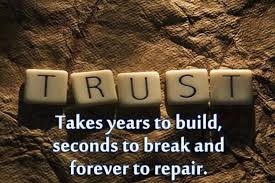AP-GfK Poll: What a Sad Commentary of Today’s Society, Two-Thirds Say People Can’t Be Trusted … #You Lie
Posted in: #You Lie,AP Telephone Scandal,Benghazi-Gate,Child Welfare,Ethics,Fast & Furious,FOX-gate - James Rosen,Good & Evil,Government,Greed,Gutter Politics,Internet,IRS-gate,Liars,Misleader,Misrepresentation,NSA,Personal Choice,Polls,Role Models,Scandal,The Lying King,Tyranny,WTF
When did “Trust” become a 4-letter word … Who will be the role models?
As the AP article says, ‘In God we trust, maybe, but not each other’. How sad. What a sad commentary on where our society has gone where Americans don’t trust each other anymore. It is one thing to have blind trust and rose colored glasses, it is quite another to have trust be remain skeptical and always question. However, the trust trends, or lack thereof have rose dramatically in the last 40 years. I think it is no surprise that it would be based on the Watergate years. But what has changed in that respect where people would think at the very least that their President could set the image of trust. But that is certainly not the case today as Americans found out that Barack Obama was lying when he told “We the People” that if you liked your healthcare plan, you could keep your healthcare plan, PERIOD! That coupled with all to many scandals like IRS-gate, AP-gate, Fast & Furious, Benghazi-gate, NSA-gate, Rosen-gate, etc. How could people really trust when they see all of these lies going on around them?
But it is larger than just politics. We need something to reverse the trend so that individuals want to trust others.
These days, only one-third of Americans say most people can be trusted. Half felt that way in 1972, when the General Social Survey first asked the question.
Forty years later, a record high of nearly two-thirds say “you can’t be too careful” in dealing with people.
An AP-GfK poll conducted last month found that Americans are suspicious of each other in everyday encounters. Less than one-third expressed a lot of trust in clerks who swipe their credit cards, drivers on the road, or people they meet when traveling.
“I’m leery of everybody,” said Bart Murawski, 27, of Albany, N.Y. “Caution is always a factor.”
Does it matter that Americans are suspicious of one another? Yes, say worried political and social scientists.
What’s known as “social trust” brings good things.
A society where it’s easier to compromise or make a deal. Where people are willing to work with those who are different from them for the common good. Where trust appears to promote economic growth.
Trust has to be earned, it does not grow on trees. And once trust is broken, it takes years, sometimes forever to repair. So, is it too late to reverse this trend? Some say that it is. Is it possible to go back to a simpler time and instill not only trust, but values in people to act accordingly? The question really is, who will step up and play the adult to make “TRUST” a valued principle?
In fact, some studies suggest it’s too late for most Americans alive today to become more trusting. That research says the basis for a person’s lifetime trust levels is set by his or her mid-twenties and unlikely to change, other than in some unifying crucible such as a world war.
People do get a little more trusting as they age. But beginning with the baby boomers, each generation has started off adulthood less trusting than those who came before them.
The best hope for creating a more trusting nation may be figuring out how to inspire today’s youth, perhaps united by their high-tech gadgets, to trust the way previous generations did in simpler times.
There are still trusters around to set an example.

Social Web